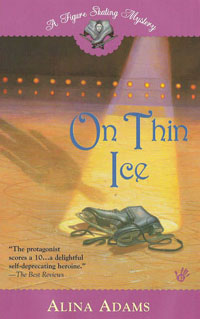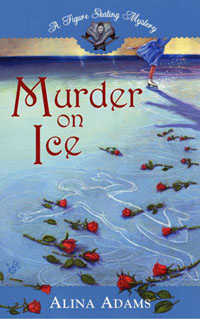LIGHTS, CAMERA... ICE DANCE!
In 1998, with the world watching every move they made, the skaters at the Nagano Olympics couldn't help but start playing to the cameras. And battling for placings not only on the ice, but among the press.
The ice-dancers proved most pugnacious, on that front. Already, television coverage of the Champions Series, during which 1994 Olympic Champs Grishuk & Platov took several falls yet continued a 21-competition winning streak, had prompted so much viewer outrage, that the ISU gave in and issued the so-called 'Platov Rule,' mandating that, for the first time, spills would require the judges to take a mandatory score deduction. Still, in spite of having a rule named after him, when it came to publicity, Platov was forced to take a back seat to his controversy-loving partner, Oksana, or, rather Pasha, Grishuk.
Claiming she was tired of being confused with fellow Olympic Gold Medalist Oksana Baiul, Grishuk legally changed her first name to Pasha. Then, for reasons she had trouble articulating, she dyed her hair the same shade of platinum blonde as her former namesake.
Grishuk & Platov may have been in Nagano trying to become the first ice-dancers ever to win two Olympic Golds, but Pasha made it clear that her true goal in life was to be an American movie star. She confidently told reporters she expected to win an Oscar in four years, and whispered to an American television producer, "All the press wants only to talk to me." When asked where that left him, a resigned Platov joked, "I will hit the gym, bulk up, and become her body-guard."
With such a colorful character to track, the media couldn't help monitoring Grishuk's every move, prompting "The Cutting Edge's" Alice Cook to observe that these Games had become all about "Pasha, Pasha, Pasha." Playing up her idolization of Marilyn Monroe, CBS even went so far as to dress Pasha up and have her sing a breathy version of "Happy Birthday, Mr. President."
Feeling that, no matter what they did on ice, they'd already lost the public-relations battle, the other dance teams hoping to challenge for Gold scurried to foster their own media impressions. Two-time World Silver Medalists, Russians Anjelika Krylova and Oleg Ovsianikov, did their best to refocus the cameras on themselves by, even in practice, dressing the exquisite Anjelika in the tightest, most revealing, sexiest outfits imaginable. But, even that proved incapable of distracting the press for long.
During a compulsory dance practice session, as soon as Anjelika and Oleg started their Tango, Grishuk & Platov magically materialized barely a foot behind them. For sixty taut, volatile seconds, the two teams skated the same dance on the same pattern; graceful, aggressive mirror-images locked in mortal combat, simultaneously trying to outdo each other and pretend they didn't know the other existed. It was The Last Tango in Nagano. It was, in the words of one producer, "orgasmic."
It was more than 1996 & 1997 World Bronze Medalists, Canadians Shae-Lynn Bourne and Victor Kraatz, could stomach.
The then six-time national champions came to Japan determined to become the first non-Russians since Great Britain's Torvill & Dean to win Olympic Gold in ice-dance, and they wasted no time launching their offensive in the media.
They began by charging that Krylova & Ovsianikov were deliberately trying to intimidate them, claiming that, at Trophee Lalique, the Russians shoved the Canadians against the boards and then fired a series of high-kicks inches from Shae's face (at 1998 Europeans, Krylova twice blindsided Grishuk & Platov, cutting Grishuk's arm and bruising Platov's calf).
Then, after the competition began and the Canadians found themselves tied for 4th place after two compulsory dances, their coach, ironically herself a Russian, Natalia Dubova, accused the judges of an anti-Canadian conspiracy. (After the compulsories, Russians Grishuk & Platov sat in first place, with Krylova & Ovsianikov in second, and the French team of Russian-born Marina Anissina & Gwendal Peizerat in third).
The media ran with the allegation, solemnly reporting over and over again that the Canadians were robbed, until even those who had not seen the competition were repeating it. Then, miraculously in the world of ice-dancing, where any sort of movement in placings is considered a historical achievement, by the next phase of the event the Canadians had moved up to a solid lock on 4th, followed by 3rd in the final Free Dance, though it wasn't enough to move them into medal position.
Seeing that his skaters were almost bounced out of the Bronze medal by a public-relations' campaign, the President of the French Skating Federation asserted it was bad form for a coach to try and change judges' opinions in the middle of a competition. "It's not fair to the judges or the skaters. Let the judges do their job and let the skaters skate."
Which, in light of what was to come at the 2002 Olympics is... really amusing.
(To Be Continued)
The ice-dancers proved most pugnacious, on that front. Already, television coverage of the Champions Series, during which 1994 Olympic Champs Grishuk & Platov took several falls yet continued a 21-competition winning streak, had prompted so much viewer outrage, that the ISU gave in and issued the so-called 'Platov Rule,' mandating that, for the first time, spills would require the judges to take a mandatory score deduction. Still, in spite of having a rule named after him, when it came to publicity, Platov was forced to take a back seat to his controversy-loving partner, Oksana, or, rather Pasha, Grishuk.
Claiming she was tired of being confused with fellow Olympic Gold Medalist Oksana Baiul, Grishuk legally changed her first name to Pasha. Then, for reasons she had trouble articulating, she dyed her hair the same shade of platinum blonde as her former namesake.
Grishuk & Platov may have been in Nagano trying to become the first ice-dancers ever to win two Olympic Golds, but Pasha made it clear that her true goal in life was to be an American movie star. She confidently told reporters she expected to win an Oscar in four years, and whispered to an American television producer, "All the press wants only to talk to me." When asked where that left him, a resigned Platov joked, "I will hit the gym, bulk up, and become her body-guard."
With such a colorful character to track, the media couldn't help monitoring Grishuk's every move, prompting "The Cutting Edge's" Alice Cook to observe that these Games had become all about "Pasha, Pasha, Pasha." Playing up her idolization of Marilyn Monroe, CBS even went so far as to dress Pasha up and have her sing a breathy version of "Happy Birthday, Mr. President."
Feeling that, no matter what they did on ice, they'd already lost the public-relations battle, the other dance teams hoping to challenge for Gold scurried to foster their own media impressions. Two-time World Silver Medalists, Russians Anjelika Krylova and Oleg Ovsianikov, did their best to refocus the cameras on themselves by, even in practice, dressing the exquisite Anjelika in the tightest, most revealing, sexiest outfits imaginable. But, even that proved incapable of distracting the press for long.
During a compulsory dance practice session, as soon as Anjelika and Oleg started their Tango, Grishuk & Platov magically materialized barely a foot behind them. For sixty taut, volatile seconds, the two teams skated the same dance on the same pattern; graceful, aggressive mirror-images locked in mortal combat, simultaneously trying to outdo each other and pretend they didn't know the other existed. It was The Last Tango in Nagano. It was, in the words of one producer, "orgasmic."
It was more than 1996 & 1997 World Bronze Medalists, Canadians Shae-Lynn Bourne and Victor Kraatz, could stomach.
The then six-time national champions came to Japan determined to become the first non-Russians since Great Britain's Torvill & Dean to win Olympic Gold in ice-dance, and they wasted no time launching their offensive in the media.
They began by charging that Krylova & Ovsianikov were deliberately trying to intimidate them, claiming that, at Trophee Lalique, the Russians shoved the Canadians against the boards and then fired a series of high-kicks inches from Shae's face (at 1998 Europeans, Krylova twice blindsided Grishuk & Platov, cutting Grishuk's arm and bruising Platov's calf).
Then, after the competition began and the Canadians found themselves tied for 4th place after two compulsory dances, their coach, ironically herself a Russian, Natalia Dubova, accused the judges of an anti-Canadian conspiracy. (After the compulsories, Russians Grishuk & Platov sat in first place, with Krylova & Ovsianikov in second, and the French team of Russian-born Marina Anissina & Gwendal Peizerat in third).
The media ran with the allegation, solemnly reporting over and over again that the Canadians were robbed, until even those who had not seen the competition were repeating it. Then, miraculously in the world of ice-dancing, where any sort of movement in placings is considered a historical achievement, by the next phase of the event the Canadians had moved up to a solid lock on 4th, followed by 3rd in the final Free Dance, though it wasn't enough to move them into medal position.
Seeing that his skaters were almost bounced out of the Bronze medal by a public-relations' campaign, the President of the French Skating Federation asserted it was bad form for a coach to try and change judges' opinions in the middle of a competition. "It's not fair to the judges or the skaters. Let the judges do their job and let the skaters skate."
Which, in light of what was to come at the 2002 Olympics is... really amusing.
(To Be Continued)






0 Comments:
Post a Comment
Links to this post:
Create a Link
<< Home